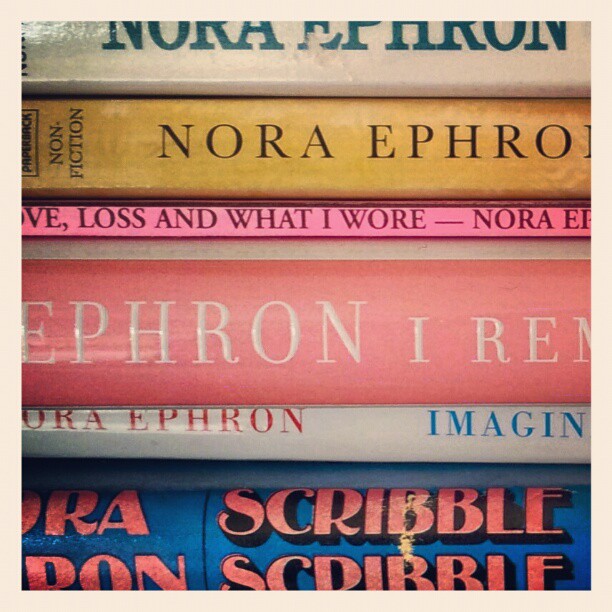It still boggles my mind that one of the most inspiring and influential female voices of our time, Nora Ephron, died last week. Not so long ago I would have quickly deleted that word “female,” thinking it was an insult to any artist to qualify her/his greatness by a gender, but now that I’ve spent a good deal of time pondering what Ephron’s work has meant to me, I realize celebrating the femaleness of all she leaves behind is actually a great compliment. After all, Ephron spent her career fighting her way to the top of some very male industries just so she could tell stories about women, for women, and by women. The femaleness of her blockbuster movies, such as “When Harry Met Sally,” “Sleepless in Seattle,” and “Julie & Julia” has in fact drawn women and their dates to theaters for decades, and these stories hold a very prominent place in the romantic ideals of me and almost every other gal I know. As an adolescent, teenager, and young woman, Nora Ephron’s flicks taught me to demand more for myself out of life and love, and I would dare to say her rom coms stirred something far greater in me than any art-house film ever has.
And yet, I’ve always felt a tinge of embarrassment whenever I tell people that Ephron’s classic films are among my favorites. Is this because of the abundance of peonies, diamond rings, and sculpture-filled fountains in nearly all of her films, or is it perhaps that I’m embarrassed of the very personal ways in which her movies have made me hope for that ever-elusive “something more?” I’m not sure, but judging from her 1996 commencement speech at Wellesley College, I’d say the femaleness of her aesthetic and brand of hope is no accident…
“Whatever you choose, however many roads you travel, I hope that you choose not to be a lady. I hope you will find some way to break rules and make a little trouble out there. And I also hope that you will choose to make some of that trouble on behalf of women.” -Nora Ephron
Although I’m sure some would argue that the material femininity and emphasis on love in Ephron’s movies did little to advance the women’s movement, I think that’s immaterial when you consider how they advanced the hopes and dreams of each individual woman who actually viewed them. Ephron’s movies depicted women who were neither damsels in distress nor emotion-void action heroines – they were instead real, flawed, and above-par-witted ladies (just like our sisters, mothers and grandmothers), who refused to sacrifice their careers or to settle for anything less than “fireworks” when it came to love. The realness and humor of these women made them equal parts entertaining and inspiring, because they always gave me the empowered sense that I could one day be like them – that I could go toe-to-toe with any man in any argument, and that a great love story was out there somewhere for me and every other gal I held dear.
Her movies showed us there was goodness and hope in this world, and that there were even happy endings as long as you were willing to work for them. As such, Ephron’s films always made me leave the theater or turn off my TV determined to work toward my own happy ending. And, when I think about this effect of her flicks, I realize I should be the opposite of embarrassed to declare my cinematic infatuation with them. Because, after all, what is the point of a movie or any other piece of art if not to inspire people to live better and work harder to make the world a more magnificent place for themselves and the people they love? Ms. Ephron’s films did this one-thousandfold for viewers, and I only hope I can someday make enough trouble on behalf of women that over the course of my lifetime girls/women/grandmothers/mothers/sisters will no longer be embarrassed to to list Nora Ephron’s movies among their favorites…Have you been moved by Ephron’s films, novels, or essays? Has her work ever inspired you to make “trouble” on behalf of women? Leave a comment.
Photo from Shelly Gross’ Instagrid via Pinterest.


No Comments